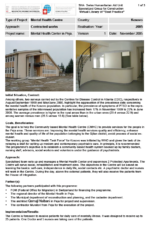
Mental Health Center in Peja.
Poffet François
Factsheet, English, 3 pages
Summary
Among others, two surveys carried out by the Centres for Disease Control in Atlanta (CDC), respectively in August/September 1999 and May/June 2000, highlight the aggravation of the prevalence data concerning the mental health of the Kosovo population. In particular, the prevalence of symptoms of PTSD in the representative samples of the interviewed population has increased from 17% in November 1999 to 25% in June 2000. The average prevalence is higher in the rural areas than in the urban ones (29.4 versus 22.9) and among women versus men (28.5 versus 18.6) (See table below). Goals, Beneficiaries: The goal is to help the Community based Mental Health Centre (CMHC) to provide services for the people in the Peja area. These services are: Improving the mental health services quality and efficiency; enhance mental health and quality of life of the population belonging to the Gjilan district; avoid process of social exclusion. The working group “Mental Health Task Force” for Kosovo was initiated by WHO and given the task of developing a draft for setting up modern and contemporary psychiatric care. In principle, it is recommended The programme’s objective is to establish a community-based health system backed up by family doctors, nursing staff, advisers, social workers and volunteers under the guidance of psychiatrists. Approach: Specialised team sets up and manages a Mental Health Center and supervises 2 Protected Apartments. The Centre will serve social, rehabilitative and treatment aims. The objectives in the Centre will be based on learning the basics: self-care, independence in daily life, social contacts etc. A psychiatric doctor and nurses will work in the Centre. During the day, above the external patients, they will also receive the patients from the House of Integration.
Publication Year
2005
Topic
Construction
